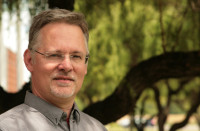Terrestrial Biodiversity
Agriculture, Crops & Soil Health
Insects & Microorganisms
Post-Doctoral Fellowships
United Kingdom
2017.06.30
Preparing for a sustainable and productive agriculture by investigating plants natural defence barrier
Boosting the plant's natural defence barrier using bacterial cocktails
"It could be seen as an arms race type of situation where pathogens and resident microbiota coevolve. However, the pathogens have to transmit between hosts through environmental reservoirs and adapt to those circumstances as well", Dr. Lauri Mikonranta summarizes. "Once we have a better understanding of the global framework of power dynamics, we can use this knowledge to our advantage and boost the micriobiome's resistance by developing strategies such as bacterial cocktails for instance". To carry out his project, Dr. Lauri Mikonranta will conduct experiments on laboratory ecosystem models and on the microbiome of tomato plants, which he will submit to the invasion of a devastating soil borne plant pathogen. Looking at how their complex interactions unfold depending on environmental conditions, the team's objective is to develop a simplified model capable of predicting what will likely happen in the wild.
" Relatively simple and environmentally friendly methods might be sufficient to suppress the worst epidemics if the tripartite interactions of environment-pathogen-resident community were understood better", Dr. Lauri Mikonranta stresses. By filling the gap, the researcher's project will significantly contribute to the development of strategies to efficiently and sustainably meet growth in food demand and climate change. Furthermore, Dr. Lauri Mikonranta's findings on eco-evolutionary principles relating to the microbiome of plants could be translated into wider microbiome framework. For instance, his research could have potential implications for human macrobiota and the development of novel probiotics.

Lauri
MIKONRANTA
Institution
University of York
Country
United Kingdom
Nationality
Finnish
Related articles
Terrestrial Biodiversity
Societal Challenges
Wildlife & Invasive Species
AXA Chair
France
2019.10.31
Invasive species: raising awareness with scenarios for the future
Scenarios as wake-up calls: following the example of climate change research The project is set in two connected parts that... Read more

Franck
COURCHAMP
Université Paris-Sud
Climate Change
Terrestrial Biodiversity
Pollution
Mountains, Glaciers, Tundra & Permafrost
Ecosystem Services
Climate Adaptation & Resilience
Water Quality
Toxic Pollutants & Hazardous Substances
AXA Chair
France
2019.04.22
The Impact of Global Change on Mountains: Assessing the Threat to Nature’s Water Towers
“Mountains, like polar regions, are particularly impacted by climate change”, explains Dirk Schmeller, multidisciplinary expert, “Temperature fluctuations are more extreme,... Read more

Dirk
SCHMELLER
